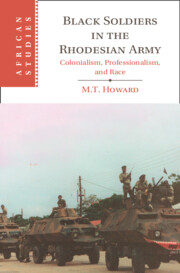8 results
2 - The Creation of Black Rhodesian Soldiers’ Regimental Loyalties
-
- Book:
- Black Soldiers in the Rhodesian Army
- Published online:
- 01 February 2024
- Print publication:
- 08 February 2024, pp 51-85
-
- Chapter
- Export citation
3 - ‘The Rhodesian Army Was the Best in Everything’
-
- Book:
- Black Soldiers in the Rhodesian Army
- Published online:
- 01 February 2024
- Print publication:
- 08 February 2024, pp 86-109
-
- Chapter
- Export citation
4 - Racism and Soldierly Loyalty During the War
-
- Book:
- Black Soldiers in the Rhodesian Army
- Published online:
- 01 February 2024
- Print publication:
- 08 February 2024, pp 110-142
-
- Chapter
- Export citation
5 - The Impact of the War upon Soldierly Loyalties
-
- Book:
- Black Soldiers in the Rhodesian Army
- Published online:
- 01 February 2024
- Print publication:
- 08 February 2024, pp 143-188
-
- Chapter
- Export citation
7 - A New ‘Government of the Day’ Dawns
-
- Book:
- Black Soldiers in the Rhodesian Army
- Published online:
- 01 February 2024
- Print publication:
- 08 February 2024, pp 211-248
-
- Chapter
- Export citation
6 - ‘They Just Follow the Government of the Day’
-
- Book:
- Black Soldiers in the Rhodesian Army
- Published online:
- 01 February 2024
- Print publication:
- 08 February 2024, pp 189-210
-
- Chapter
- Export citation

Black Soldiers in the Rhodesian Army
- Colonialism, Professionalism, and Race
-
- Published online:
- 01 February 2024
- Print publication:
- 08 February 2024
7 - ‘A Big Small Man’
-
- Book:
- The Army and Politics in Zimbabwe
- Published online:
- 15 January 2020
- Print publication:
- 16 January 2020, pp 156-188
-
- Chapter
- Export citation


